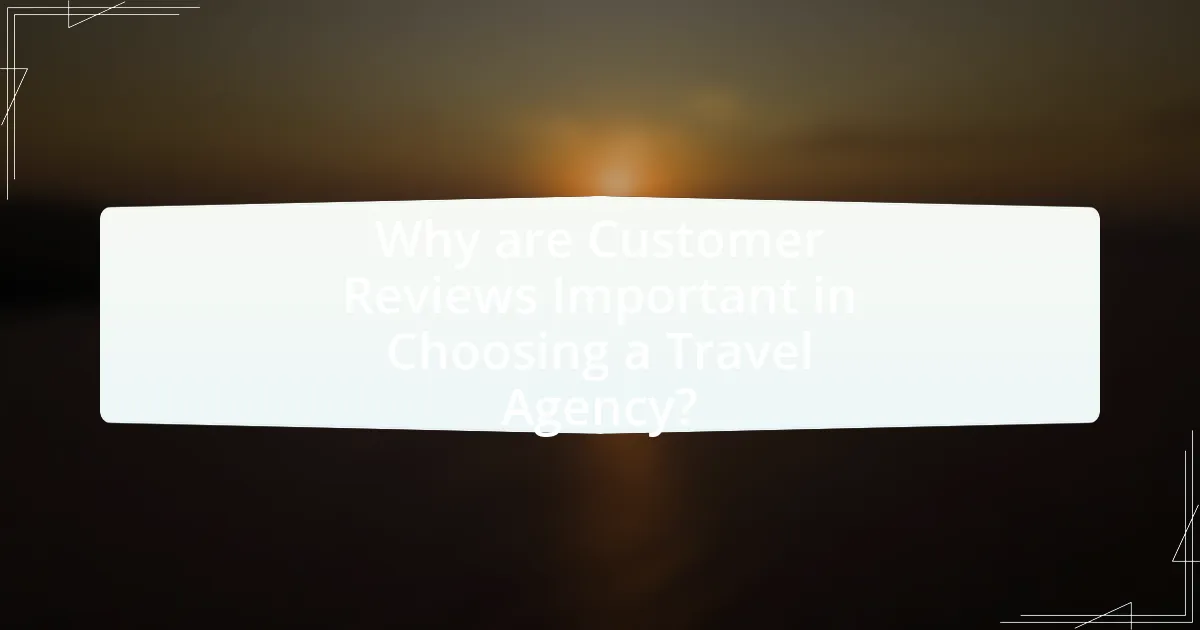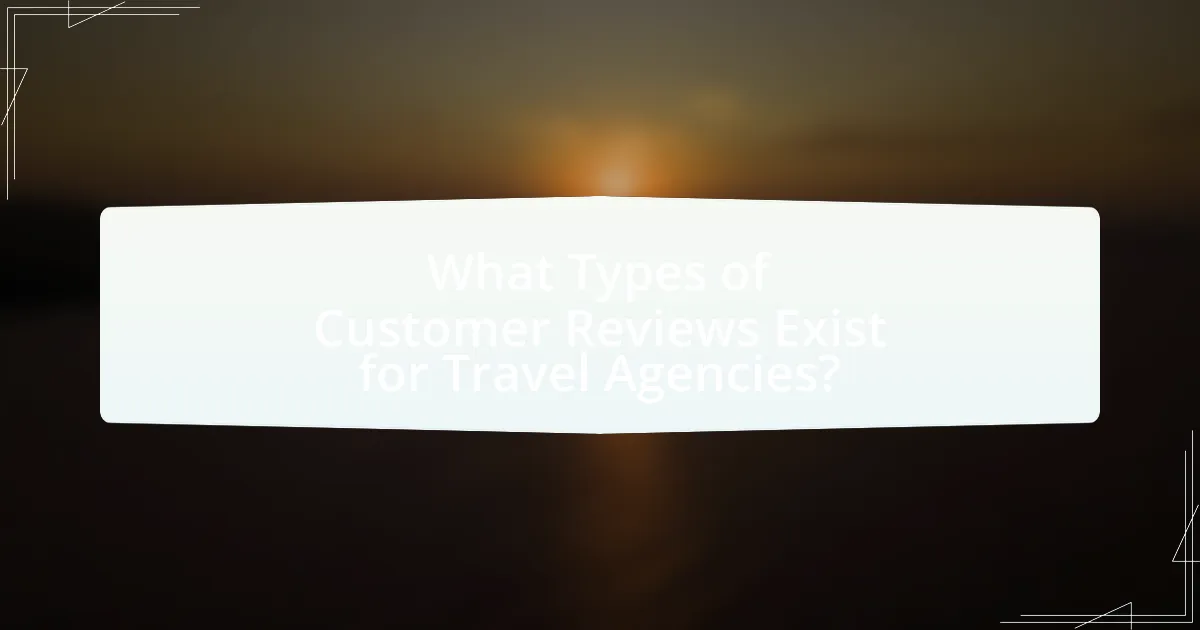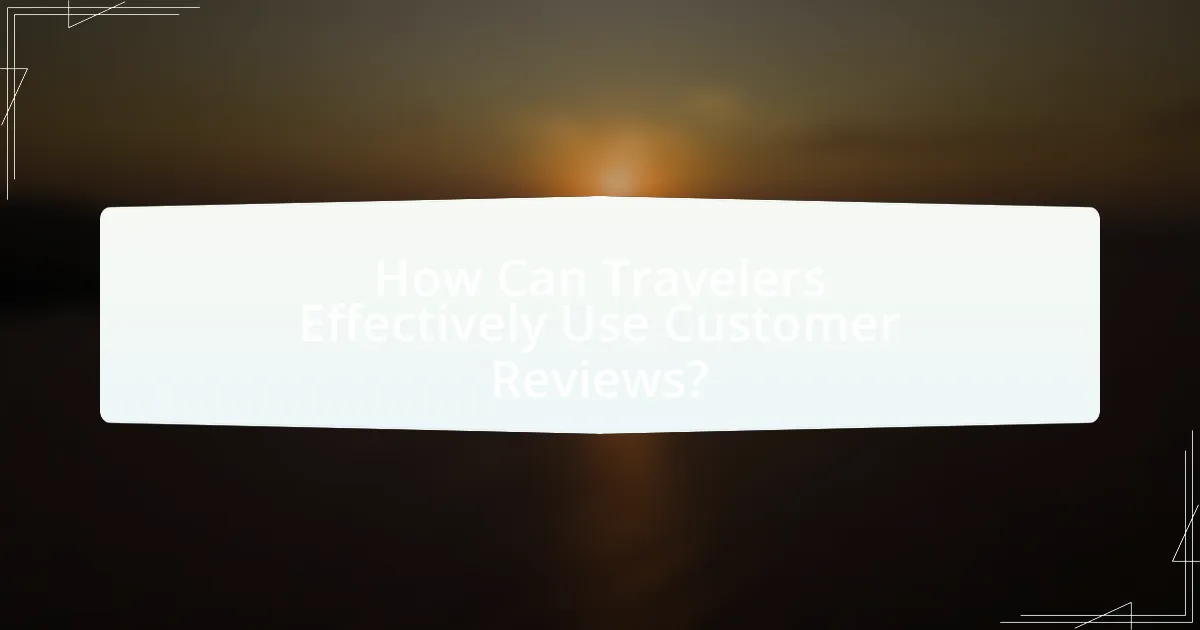Customer reviews play a crucial role in selecting a travel agency, offering insights into the experiences of previous clients and influencing potential customers’ decisions. The article explores how reviews provide social proof, establish trust, and impact consumer behavior, with research indicating that a significant percentage of consumers trust online reviews as much as personal recommendations. It also examines the psychological factors that enhance the effectiveness of reviews, the types of reviews available, and the platforms where they are commonly found. Additionally, the article discusses strategies for travelers to effectively utilize reviews, identify fake feedback, and avoid common pitfalls when evaluating travel agencies.

Why are Customer Reviews Important in Choosing a Travel Agency?
Customer reviews are important in choosing a travel agency because they provide insights into the experiences of previous clients, helping potential customers make informed decisions. Reviews often highlight the quality of service, reliability, and overall satisfaction, which are critical factors when selecting a travel agency. According to a survey by BrightLocal, 91% of consumers read online reviews before making a purchase, indicating that reviews significantly influence consumer behavior. Additionally, platforms like TripAdvisor and Yelp aggregate customer feedback, allowing users to compare agencies based on real experiences, further validating the importance of reviews in the decision-making process.
How do customer reviews influence consumer decisions?
Customer reviews significantly influence consumer decisions by providing social proof and shaping perceptions of products or services. Research indicates that approximately 79% of consumers trust online reviews as much as personal recommendations, highlighting their impact on purchasing behavior. Positive reviews can enhance a travel agency’s credibility, leading to increased bookings, while negative reviews can deter potential customers. Furthermore, a study published in the Journal of Marketing Research found that a one-star increase in a business’s Yelp rating can lead to a 5-9% increase in revenue, demonstrating the direct correlation between customer feedback and consumer choices.
What psychological factors make reviews impactful?
Psychological factors that make reviews impactful include social proof, trustworthiness, and emotional resonance. Social proof occurs when individuals look to the experiences of others to guide their own decisions, particularly in uncertain situations like choosing a travel agency. Trustworthiness is established through the perceived authenticity of the review, where detailed and specific feedback enhances credibility. Emotional resonance plays a crucial role as reviews that evoke strong feelings can significantly influence potential customers’ perceptions and decisions. Research indicates that 79% of consumers trust online reviews as much as personal recommendations, highlighting the importance of these psychological factors in shaping consumer behavior.
How do reviews compare to other forms of information?
Reviews provide subjective insights and personal experiences that differentiate them from other forms of information, such as advertisements or expert opinions, which often present a more generalized or biased perspective. Research indicates that 79% of consumers trust online reviews as much as personal recommendations, highlighting their significant influence in decision-making processes. In contrast, traditional marketing materials may lack authenticity and fail to address specific customer concerns, making reviews a more reliable source for potential travelers evaluating travel agencies.
What role do customer reviews play in establishing trust?
Customer reviews play a crucial role in establishing trust by providing authentic feedback from previous clients, which influences potential customers’ perceptions. When individuals consider a travel agency, they often rely on reviews to gauge the reliability and quality of services offered. Research indicates that 79% of consumers trust online reviews as much as personal recommendations, highlighting their significant impact on decision-making. Furthermore, positive reviews can enhance a travel agency’s credibility, while negative reviews can deter potential clients, demonstrating the direct correlation between customer feedback and trustworthiness in the travel industry.
How do positive reviews enhance credibility?
Positive reviews enhance credibility by providing social proof that a travel agency delivers quality services. When potential customers see numerous favorable testimonials, they perceive the agency as trustworthy and reliable. Research indicates that 79% of consumers trust online reviews as much as personal recommendations, highlighting the significant impact of positive feedback on consumer decision-making. This trust is further reinforced by the fact that positive reviews often detail specific experiences, showcasing the agency’s strengths and reliability, which collectively contribute to a stronger reputation in the competitive travel industry.
What are the consequences of negative reviews?
Negative reviews can significantly harm a travel agency’s reputation and customer trust. Research indicates that 84% of people trust online reviews as much as personal recommendations, meaning negative feedback can deter potential clients. Additionally, a study by Harvard Business School found that a one-star increase in a Yelp rating can lead to a 5-9% increase in revenue, highlighting the financial impact of negative reviews. Consequently, travel agencies may experience decreased bookings, lower customer retention, and a diminished competitive edge in the market.

What Types of Customer Reviews Exist for Travel Agencies?
Customer reviews for travel agencies typically fall into several categories: positive reviews, negative reviews, and neutral reviews. Positive reviews highlight exceptional service, memorable experiences, and satisfaction with travel arrangements, often citing specific aspects like customer support and itinerary planning. Negative reviews focus on issues such as poor communication, unmet expectations, or logistical problems, providing detailed accounts of unsatisfactory experiences. Neutral reviews may offer balanced perspectives, acknowledging both strengths and weaknesses of the agency without strong emotional bias. These types of reviews are crucial as they influence potential customers’ decisions, with studies indicating that 84% of people trust online reviews as much as personal recommendations.
How do online reviews differ from traditional word-of-mouth?
Online reviews differ from traditional word-of-mouth primarily in their accessibility and permanence. While traditional word-of-mouth relies on personal interactions and can be fleeting, online reviews are publicly available and can be accessed by a wide audience at any time. According to a 2021 survey by BrightLocal, 87% of consumers read online reviews for local businesses, highlighting the significant reach and influence of online feedback compared to personal recommendations, which are often limited to small social circles. Additionally, online reviews can be aggregated and analyzed, providing businesses with quantifiable data on customer sentiment, unlike the subjective nature of verbal recommendations.
What platforms are most commonly used for travel agency reviews?
The most commonly used platforms for travel agency reviews are TripAdvisor, Google Reviews, and Yelp. TripAdvisor is widely recognized for its extensive database of user-generated reviews and ratings for travel services, making it a primary source for travelers seeking feedback on agencies. Google Reviews integrates seamlessly with Google Maps and Search, providing users with easy access to reviews while searching for travel agencies. Yelp is also significant, particularly in North America, where it offers detailed reviews and ratings for various service providers, including travel agencies. These platforms collectively influence consumer decisions by providing insights into customer experiences and satisfaction levels.
How do social media reviews impact travel agency reputation?
Social media reviews significantly impact travel agency reputation by influencing potential customers’ perceptions and decisions. Positive reviews enhance credibility and attract new clients, while negative reviews can deter potential customers and damage the agency’s image. According to a study by BrightLocal, 79% of consumers trust online reviews as much as personal recommendations, highlighting the critical role of social media feedback in shaping public opinion. Additionally, a survey by TripAdvisor found that 94% of travelers consider reviews important when selecting a travel agency, further demonstrating the direct correlation between social media reviews and agency reputation.
What are the characteristics of helpful customer reviews?
Helpful customer reviews are characterized by specificity, clarity, and relevance. Specificity involves detailed descriptions of experiences, including particular services used, destinations visited, and outcomes achieved, which provide potential customers with concrete insights. Clarity ensures that the language is straightforward and free of jargon, making it accessible to a broad audience. Relevance means that the review addresses aspects that are important to prospective travelers, such as customer service, pricing, and overall satisfaction. Research indicates that reviews with these characteristics are more likely to influence purchasing decisions, as they provide trustworthy and actionable information for consumers evaluating travel agencies.
What specific details should a good review include?
A good review should include specific details such as the reviewer’s personal experience, the quality of service received, the responsiveness of the travel agency, and any notable aspects of the trip, such as accommodations and activities. These elements provide potential customers with a clear understanding of what to expect. For instance, a review that mentions prompt communication and well-organized itineraries can help others gauge the reliability of the agency. Additionally, including both positive and negative aspects offers a balanced perspective, which is crucial for informed decision-making.
How can the tone of a review affect its usefulness?
The tone of a review significantly affects its usefulness by influencing the reader’s perception and emotional response. A positive tone can enhance credibility and encourage trust, making potential customers more likely to consider the travel agency favorably. Conversely, a negative tone may evoke skepticism or fear, leading readers to avoid the agency. Research indicates that reviews with a friendly or enthusiastic tone are perceived as more helpful, as they create a sense of relatability and connection. For instance, a study published in the Journal of Consumer Research found that reviews with a warm tone increased the likelihood of purchase intentions by 30%. Thus, the tone directly impacts how effectively a review communicates its message and sways consumer decisions.

How Can Travelers Effectively Use Customer Reviews?
Travelers can effectively use customer reviews by analyzing the overall ratings and specific feedback to gauge the quality of a travel agency. By focusing on both positive and negative reviews, travelers can identify consistent themes regarding service quality, responsiveness, and value for money. Research indicates that 79% of consumers trust online reviews as much as personal recommendations, highlighting their significance in decision-making. Additionally, travelers should consider the number of reviews; a higher volume of reviews can indicate reliability and a broader customer experience.
What strategies can travelers employ to evaluate reviews?
Travelers can employ several strategies to evaluate reviews effectively. First, they should analyze the overall rating and the number of reviews, as a high rating with a substantial number of reviews typically indicates reliability. Additionally, travelers should read a mix of positive and negative reviews to gain a balanced perspective; this helps identify consistent themes or issues mentioned by multiple reviewers.
Furthermore, travelers should check the reviewer’s profile for credibility, looking for verified purchases or consistent contributions to ensure authenticity. They can also consider the recency of the reviews, as more recent feedback is likely to reflect the current state of the travel agency.
Lastly, utilizing review aggregation sites that compile reviews from various platforms can provide a broader view of customer experiences. These strategies collectively enhance the ability to discern the quality and reliability of a travel agency based on customer feedback.
How can travelers identify fake or biased reviews?
Travelers can identify fake or biased reviews by analyzing the language, patterns, and sources of the reviews. Reviews that contain overly positive or negative language, lack specific details, or are posted in clusters within a short time frame often indicate manipulation. Additionally, checking the reviewer’s profile for a history of posting similar reviews can reveal bias. Research shows that 30% of online reviews are fake, highlighting the need for vigilance. Tools like review verification services can also assist in assessing authenticity.
What should travelers look for in a review to gauge agency quality?
Travelers should look for detailed feedback on customer service, responsiveness, and the quality of services provided in reviews to gauge agency quality. Reviews that highlight specific experiences, such as how the agency handled issues or provided support during trips, offer valuable insights into their reliability and professionalism. Additionally, consistent positive ratings regarding the agency’s ability to meet expectations and deliver on promises further validate their quality. For instance, a review mentioning timely communication and effective problem resolution indicates a trustworthy agency.
What common pitfalls should travelers avoid when reading reviews?
Travelers should avoid relying solely on extreme reviews, whether overly positive or negative, as they often do not represent the average experience. Many reviews are influenced by personal biases or isolated incidents, which can skew perceptions. Additionally, travelers should be cautious of fake reviews, which can mislead them; a study by the University of California found that up to 30% of online reviews may be fraudulent. Lastly, travelers should consider the date of the reviews, as outdated feedback may not reflect current conditions or services.
How can over-reliance on reviews lead to poor choices?
Over-reliance on reviews can lead to poor choices by creating a skewed perception of a travel agency’s quality. When individuals focus excessively on reviews, they may overlook critical factors such as personal preferences, specific needs, or the context of the reviews. For instance, a travel agency may have numerous positive reviews, but if those reviews are based on experiences that do not align with a person’s travel style or requirements, the choice may not be suitable. Additionally, reviews can be manipulated or biased, leading to decisions based on misleading information. Research indicates that 30% of online reviews are suspected to be fake, which further complicates the reliability of reviews as a decision-making tool. Therefore, relying solely on reviews can result in choices that do not meet the individual’s expectations or needs.
What are the risks of focusing solely on star ratings?
Focusing solely on star ratings poses several risks, including the potential for misleading evaluations of service quality. Star ratings often fail to capture the nuances of customer experiences, as they may not reflect specific strengths or weaknesses of a travel agency. For instance, a travel agency with a high star rating might have received it due to a few exceptional reviews, while numerous negative experiences go unreported. Additionally, star ratings can be influenced by factors unrelated to service quality, such as marketing strategies or incentivized reviews, which can distort the true representation of customer satisfaction. Research indicates that 70% of consumers trust online reviews as much as personal recommendations, highlighting the importance of comprehensive feedback beyond just star ratings.
What are the best practices for leveraging customer reviews when choosing a travel agency?
To effectively leverage customer reviews when choosing a travel agency, individuals should prioritize reading a diverse range of reviews to gain a comprehensive understanding of the agency’s strengths and weaknesses. Analyzing both positive and negative feedback allows potential customers to identify consistent themes, such as customer service quality, responsiveness, and value for money. Research indicates that 84% of people trust online reviews as much as personal recommendations, highlighting the significance of customer feedback in decision-making. Additionally, checking the agency’s response to reviews can provide insight into their customer service approach, as agencies that engage with reviewers demonstrate a commitment to addressing concerns and improving their services.

Leave a Reply